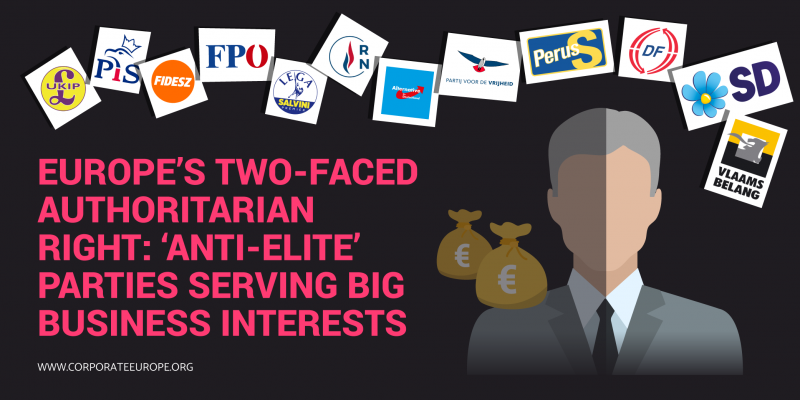
Authoritarian right: Germany
The German authoritarian right-wing party Alternative für Deutschland (AfD) has been embroiled in a series of scandals around dark money flows. Several leading party figures have accepted illegal donations, including Jörg Meuthen, one of the two leaders of the party and its top candidate for the European elections; and Alice Weidel, the co-Chair of the AfD group in the German Parliament. In both cases the money was channelled via Switzerland.
Click here to read the full report, or check out the report's methodology and data set
In 2016, the Swiss PR firm Goal AG organised an election campaign for Meuthen with billboard posters, adverts and flyers. The company also ran Meuthen’s campaign website for the 2016 elections in the state of Baden-Wuerttemberg. All campaign activities were branded as AfD activities, but were paid for by undisclosed donors. Goal AG has a history of working with the right-populist SVP in Switzerland as well as with other right-wing parties in Europe and the Europe of Nations and Freedom (ENF) group in the European Parliament. After enquiries by the authorities the AfD provided a list of donors behind the campaign for Meuthen. But media investigations show that the donors’ list was fake, with people offered money in return for providing their names as fronts. The Bundestagsverwaltung (Secretariat of the German Parliament) has fined the AfD approximately €270,000 for the illegal donations to Meuthen. Under Germany’s party laws, anonymous donations or those made via middlemen are banned.
Campaign contributions from states outside the EU are also banned unless the company is owned by a German citizen. In the case of the AfD’s co-Chair, Alice Weidel, in 2017 a small Swiss firm, PWS, was used as a middleman to channel donations totalling about €130,000 to her local party chapter. Later the AfD produced another list they said were the original donors behind PWS. But also this list turned out to be fake, and another fine is also likely to be levied in this case. Further criminal proceedings are still ongoing. Investigative journalists have linked these fake donors with the German billionaire Henning Conle. According to the evidence Conle is the donor for Weidel and presumably also for Meuthen.
Beyond illegal donations to individual AfD politicians, the party also appears to have a second channel of dark money. Since 2016 a dubious association has been running huge election campaigns including billboards, election newspapers, online adverts, and videos supporting the AfD. The association, “Verein zur Erhaltung der Rechtsstaatlichkeit und der bürgerlichen Freiheiten” is obviously a front group. It has no offices, just a letterbox address, and these election campaigns were again organised by Goal AG. German corporate watchdog LobbyControl estimates that the campaigns have been worth more than €10 million. Journalists have found signs that one of the donors could be August von Finck Junior, a super-rich German national living in Switzerland, who is known to have links to right-wing libertarian thinking, such as the German Ludwig von Mises-Institute.
The AfD has been supported by millions in dark money since 2016. The party has tolerated this secretive support.
Overall, the AfD has been supported by millions in dark money since 2016. The party has tolerated this secretive support. In some cases the party has violated the law. In other cases the secretive donors have tried to exploit legal loopholes. The scandals have clearly demonstrated the need to improve and strengthen German transparency rules.
The donors are still only partially known. But it seems that the money came largely from an upper-class network. So it’s probably not by accident that AfD politicians like Meuthen and Weidel received special support as both belong to the pro-business, free-market wing of the party. In terms of tax policies the AfD is still very supportive of the rich. Its platform for the 2019 European elections argues in favour of competition betweens states on corporate taxes. This competition is to the advantage of transnational corporations.
In line with this, the AfD opposed 10 of the 14 European Parliament votes that Corporate Europe Observatory studied, including action to tackle the gender pay gap; ending fossil fuel subsidies; a 25 per cent corporate tax rate; a proposal for a directive on ‘decent work’; action on work-life balance; health and safety at work; and others. After the 2014 European elections the AfD had seven MEPs, now reduced to one, after in-fighting and defections. In response to a question from Corporate Europe Observatory, MEP Meuthen’s office wrote: “The AfD is against European federalism and wants to return competences to the Member States, is opposed to any involvement of the EU in taxation sovereignty of the MS and wants to improve subsidiarity.” But the AfD voted in support of a pan-EU three per cent digital services tax likely to cover Google, Facebook, and other digital platforms so its voting record cannot be solely explained by subsidiarity.
Text supplied by LobbyControl www.lobbycontrol.de
More reading (in German):
-
More information: “Verein zur Erhaltung der Rechtsstaatlichkeit und der bürgerlichen Freiheiten” via LobbyControl’s online Lobbypedia.
-
Short overview of the illegal support for Jörg Meuthen.
Click here to read the full report, or check out the report's methodology and data set
